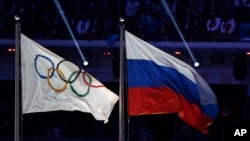On yet another doping-tainted day for Russian sport, 28 athletes now face IOC cases linked to cheating at the Sochi Winter Olympics and a major cross-country skiing event was removed from the country.
The IOC said Friday it has opened 28 disciplinary proceedings against Russian athletes whose urine samples were likely tampered with at the 2014 Olympics.
Six cases involve cross-country skiers who are now provisionally suspended by the International Ski Federation (FIS), which did not identify them. Six Russian men won five medals, including one gold, in cross-country skiing on home snow at Sochi.
The new wave of Olympic doping cases is set to produce a flow of verdicts and disqualifications next year that could fuel calls for some or all of the Russian team to be banned from the 2018 Pyeongchang Winter Olympics in South Korea.
The cases are based on evidence provided this month by World Anti-Doping Agency investigator Richard McLaren.
McLaren detailed vast state-backed cheating in Russian sport that included swapping athletes' tainted samples for clean urine through the testing laboratory at Sochi.
The Canadian law professor offered evidence of a method for state intelligence officers to break open supposedly tamper-proof glass sample bottles which had scratches behind the lid. Urine samples retained by the IOC since Sochi included some with unnatural levels of salt in healthy humans.
In further fallout from McLaren's report, the world ski body said Russian officials have handed back hosting rights for the end-of-season World Cup finals in cross-country skiing.
The event was scheduled in March in Tyumen, which on Thursday also lost the right to host a biathlon World Cup event in March.
"The findings in the McLaren Report have seriously damaged the integrity of sport and we are determined to ensure the necessary measures are undertaken to punish the offences," said FIS President Gian Franco Kasper, who is also a member of the IOC's executive board.
The IOC said the 28 new cases being examined by its disciplinary commission are not positive doping tests. However the manipulation of the samples themselves could lead to an Anti-Doping Rule Violation and sanctions.
Samples from Russian athletes at Sochi are now being re-tested at the WADA-accredited lab in Lausanne, Switzerland, the IOC said.
The IOC cites legal reasons for not identifying the athletes.
FIS said it was the responsibility of the Russian ski federation and the athletes themselves if they wished to be identified.
On Thursday, the International Biathlon Union said it provisionally suspended two Russians whose cases from Sochi were opened by the IOC.
The re-testing of Russian athletes' samples for traces of steroids and other banned substances now involves all four Olympic Games from 2008 through 2014.
The IOC said Friday that it already disqualified 27 Russian athletes, stripping an array of titles and medals, in re-tests of samples from the 2008 Beijing Olympics and 2012 London Olympics. All Russian samples from the 2010 Vancouver Winter Olympics are now being re-analyzed.
At Vancouver, an underachieving Russia team placed 11th in the medals table. That performance is often cited as the motive for Russia to orchestrate a doping program to ensure better results in the home Sochi Olympics, which cost $51 billion to build and run.
Russia did top the Sochi medals table, but looks certain to lose that place to Norway when the IOC processes the disciplinary cases announced Friday.




